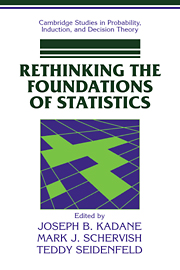Book contents
- Frontmatter
- Contents
- Introduction
- PART 1 DECISION THEORY FOR COOPERATIVE DECISION MAKING
- PART 2 THE TRUTH ABOUT CONSEQUENCES
- 2.1 Separating Probability Elicitation from Utilities
- 2.2 State-dependent Utilities
- 2.3 Shared Preferences and State-dependent Utilities
- 2.4 A Conflict Between Finite Additivity and Avoiding Dutch Book
- 2.5 Statistical Implications of Finitely Additive Probability
- PART 3 NON-COOPERATIVE DECISION MAKING, INFERENCE, AND LEARNING WITH SHARED EVIDENCE
- Index of Names
- Subject Index
2.1 - Separating Probability Elicitation from Utilities
Published online by Cambridge University Press: 05 June 2012
- Frontmatter
- Contents
- Introduction
- PART 1 DECISION THEORY FOR COOPERATIVE DECISION MAKING
- PART 2 THE TRUTH ABOUT CONSEQUENCES
- 2.1 Separating Probability Elicitation from Utilities
- 2.2 State-dependent Utilities
- 2.3 Shared Preferences and State-dependent Utilities
- 2.4 A Conflict Between Finite Additivity and Avoiding Dutch Book
- 2.5 Statistical Implications of Finitely Additive Probability
- PART 3 NON-COOPERATIVE DECISION MAKING, INFERENCE, AND LEARNING WITH SHARED EVIDENCE
- Index of Names
- Subject Index
Summary
ABSTRACT
This chapter deals with the separation of probability elicitation from utilities. We show that elicited probabilities can be related to utilities not just through the explicit or implicit payoffs related to the elicitation process, but also through other stakes the expert may have in the events of interest. We study three elicitation procedures – lotteries, scoring rules, and promissory notes – and show how the expert's utility function and stakes in the events can influence the resulting probabilities. Particularly extreme results are obtained in an example involving a market at equilibrium. The applicability of a no-stakes condition and some implications for probability elicitation are discussed. Let π represent an expert's probability for an event A, and let p denote the elicited probability from some elicitation procedure. We determine the value of p that maximizes the expert's expected utility. When utility is linear in money, p = π for all of the procedures studied here. Under nonlinear utility, the lottery procedure still yields p = π as long as the expert has no other stakes involving the occurrence or nonoccurrence of A (the no-stakes condition). With the scoring-rule and promissorynote procedures, the no-stakes condition is no longer sufficient for p = π in the presence of nonlinear utility. If the no-stakes condition holds and the elicitationrelated payoffs approach 0, then p = π in the limit. For all three procedures, the combination of nonlinear utility and other stakes can lead to values of p other than π.
- Type
- Chapter
- Information
- Rethinking the Foundations of Statistics , pp. 133 - 148Publisher: Cambridge University PressPrint publication year: 1999

